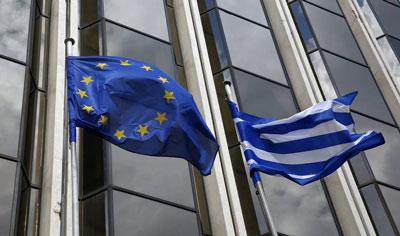Total confusion about a Greek deal

EU Council president Donald Tusk announced this morning that the planned EU summit is cancelled and that a separate euro zone summit meeting will start at 1400 GMT (1600 local time).
Tusk said the eurozone summit would last until we conclude talks” on Greece.
A full day of talks Saturday among the 19 finance ministers hardly brought the sides closer together, with ministers still distrustful over Greece’s ability to enact financial reforms.
That has revived fears that Greece could be left to go bankrupt and crash out of the eurozone — an development that has been dubbed a “Grexit.”
Greek lawmakers have backed Prime Minister Alexi Tsipras’s promises for a reform package that includes higher taxes, raising the retirement age, and public-sector reforms.
Tsipras wants a 54 billion-euro bailout package to cover Greece’s massive debts until 2018.
But Eurogroup President and Dutch Finance Minister Jeoen Dijsselbloem said early on July 12 that the talks are “very difficult” and that there is still “a major issue of trust” and “credibility” regarding Greece’s promises.
Dijsselbloem said: “It is still very difficult but work is still in progress.”
The pressure was on Greece all Saturday even after the country’s parliament passed a harsh austerity package that it hopes will lead to a three-year bailout. Over and over in Brussels, finance ministers and top officials of the eurozone said the same thing — we don’t fully trust you to make good on your promises.
A European official present at the discussions, when asked what more needed to be discussed when ministers reconvene Sunday, said “everything.”
The official, who spoke on condition of anonymity because he’s not authorized to talk publicly, said ministers wanted “more specific and binding commitments” and that the Greek government’s proposals were “too little, too late.”
Assuaging those concerns is the task facing Euclid Tsakalotos, who has been Greek finance minister for barely a week, following the resignation of his outspoken predecessor Yanis Varoufakis.
But he needs to do it as Greece desperately needs the money to avoid a financial collapse. Greece’s banks, according to some accounts, have barely enough cash in their vaults to see the country through the week.
Greece’s banks have been shuttered for the best part of two weeks and daily withdrawals from ATMs have been limited to a paltry 60 euros. The economy is in freefall and the country faces big debt repayments in coming weeks.
Early on Saturday, Greek Prime Minister Alexis Tsipras cleared one hurdle. Lawmakers in the Greek parliament overwhelmingly backed a package of economic reforms and further austerity measures, in the hope that it would convince European creditors to back a third bailout of the country. Greece has made a request to Europe’s bailout fund for a 53.5 billion-euro ($59.5 billion) 3-year financial package but many officials in Brussels put that figure much higher.
Still, the measures proposed, which include changes long-demanded by creditors, such as changes to pensions and sales taxes, weren’t enough to unlock an agreement in Brussels. Following months of deteriorating relations, creditors are demanding firm legislative action to back up the proposals at the very least.
German Finance Minister Wolfgang Schaeuble, who has taken a hard line on Greece over recent months, said the Greek government will have to do a lot more than just say it wants to reform if it’s going to get more money.
“We will definitely not be able to rely on promises,” he said. “We are determined to not make calculations that everyone knows one cannot believe in.”
Schaeuble was clear in who he blamed for the current crisis. He put that firmly on the shoulders of the radical left Syriza government that was elected in January on an anti-austerity prescription. The “hopeful” economic situation regarding Greece at the end of last year has been “destroyed by the last months.”
Finland is perhaps taking the hardest line of all. Reports out of the country said the coalition government was balking at further assistance for Greece.
The eurozone ministers have to give their blessing to Greece’s bailout request to the European Stability Mechanism. Traditionally, eurozone ministers agree by mutual consensus, though in exceptional circumstances a unanimous vote may not be needed.
Greece has received bailouts totaling 240 billion euros in return for deep spending cuts, tax increases and reforms from successive governments. Though the country’s annual budget deficit has come down dramatically, Greece’s debt burden has increased as the economy has shrunk by a quarter.
Source: New Europe




























